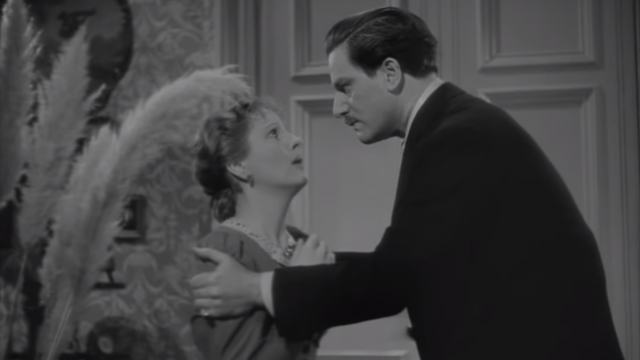One of the things art can do is create language and symbols for us, and this is a work that both reflects and embodies a major tool of abuse. The biggest thing that people who study abuse try to convey is that abusers will spin a narrative that they weren’t in control of their actions when, in fact, they are downright obsessive about control – I remember reading about abusers who defended their physical abuse on the basis that they’d lost control of their temper, but when asked if they’d ever hit their mothers, would voraciously deny it; they can control whether they hit their mother, but not their partner? Anton Walbrook as Paul (or rather Louis) sells us on the idea of a man who is complete control of every aspect of his environment; if something happens around him, it’s because he either willed it or allowed it, and everything that comes out of his mouth is either a command or a judgement, and Diana Wynyard as Bella conveys the terror of, in turn, having to control one’s every action in the face of a creature that will severely punish misdeeds, only to find one has no control in the first place, increasingly surrendering your control to someone who cannot be entirely trusted. At the same time, Louis (or Paul, if you prefer) has his own terror, a constant anxiety that 100% control will slip to even 99% control, his smooth movements and hard expression softening like jelly. This is a deeply anxiety-inducing movie, as both heroine and villain alike are constantly living on the edge.
Power and control are often things played for heroism; characters like Captain America or Law & Order detectives or Batman are considered heroic because they enforce their will on the world. But I keep finding this is an attitude that’s just not practical in any sense of the term; to riff on Rust Cohl’s observation, life’s barely long enough to get good at one thing, let alone master literally everything that will let you genuinely control any single environment, let alone master all environments. More than that though, it’s neither emotionally healthy nor a path to goodness. Paul/Louis’s situation is an extreme, actively evil expression of that need for control, but it also makes me think of the things I’ve been learning in studying to work in aged care; I happening to be coming into the industry during an Australia-wide shakeup and shift in values, and what they’ve been stressing is that Springfield Retirement Home image you may have comes from workers in the past who saw themselves as someone who must force the world to fit their conception of how it should look, when we’d be more effective at our jobs if we saw ourselves as supporting players in the individual stories of the people we work with. Emotionally speaking, I’ve never seen a story play off both my compassion and self-interest to the same level at the same time as in this film; I don’t want to be somebody’s Louis/Paul, inflicting that kind of suffering on someone, but I also don’t want generate that exhausting anxiety trying to keep up being Paulouis.

